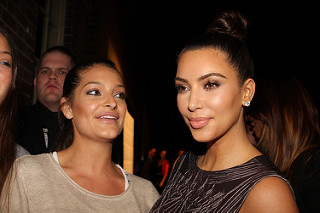
Kashing in on Feminism
by Niloo Sharifi | February 26, 2016
“I have a theory,” a friend whispered to me in a conspiratorial tone, “Kim Kardashian is a genius.”
This was not the first time I’d heard such an opinion. In recent years, the mainstream media has affected a habit of reducing feminist icon status to the success of rich, conventionally attractive women. When my friend explained that Kim’s manicured persona is a careful performance of the cultural stereotypes that seek to trap her, she was simply restating a line taken by several news outlets: Kim’s privacy may have been violated and her body objectified, but she has nevertheless transformed herself into a highly profitable commodity. To my friend, and several journalists, Kim Kardashian represents a kind of feminist victory. In July 2015 the Telegraph wrote: “[Kim is] undeniably trashy, unashamedly vulgar, but any woman who can turn a leaked sex tape into a $53 million dollar fortune is surely the embodiment of girl power.” Recently, this take on women who are ‘famous for being famous’ has gained momentum. In December, the “female-focused” Vice-owned website Broadly published an article titled: ‘This is how Paris Hilton fooled the entire United States of America.’ The subheading reads: “Through the power of a fake baby voice, Paris Hilton launched a business empire, invented reality TV superstardom, and disrupted American culture.” This point of view transposes the lexis of innovation and revolution onto women who have little interest in advocating for women’s rights, patently ignoring the privilege afforded to them by their families’ wealth. There is no mention of the women who don’t have the means to do anything when their sex tapes are leaked. The article does little to substantiate its own claims about Paris. The grandest revelation it offers is that she sometimes doesn’t talk in a baby voice.
I began writing this piece as a response to the indignation I felt at the concept of these women as feminist icons. But as I went on, deconstructing their numerous ‘problematic’ statements felt like an increasingly hollow exercise. I found little evidence of Kim or Paris attempting to posit themselves as feminist trailblazers. Paris herself says it most succinctly in her autobiography, Confessions of an Heiress: “I created a new opportunity for young heiresses” — but not for the rest of us. Teenage feminists may admire these reality stars for exuding radical self-love and autonomous expression of their sexuality. Still more may see their feminism, and their love for Kim, as mutually exclusive. But Kim has been practically hounded into calling herself a feminist. In 2015 she stated: “I guess people call me a feminist, but I don’t like to put labels on things.” The following day, the Independent transformed this statement into a widely read headline. Then Rolling Stone promoted on their website an upcoming issue starring Kim Kardashian. The byline read: “Kanye, Caitlyn, feminism and more: Kim K tackles it all in our wide-ranging new interview”. Her response to the feminist question was different this time, but only slightly. She said: “I don’t like to push my view… but, yeah. I think you would call me a feminist.” The cascade of articles that followed mimicked Rolling Stone’s jubilant and relieved tone: ‘Yes, you can call her a feminist’. As feminism is commercialized, it is diluted and turned into a commodity itself. These magazines ignored Kim’s dislike of labels, instead making sure “Kim” and “feminist” made it into bold print at the top of the page. But why should Kim ‘tackle it all’? Under the guise of promoting feminism, corporations continue to push women into spaces they clearly don’t want to occupy.
Yet despite the debate gaining influence, the spokespeople for these debates continue to be conspicuously congeneric. Influential people of colour have been whitewashed out of films like Suffragette and Stonewall, films that celebrate progress that wouldn’t have happened without them. This brand of feminism, frequently dubbed ‘white feminism’, fails to address the complexities inherent in living at the intersection of several types of oppression. Eurocentric critiques of ‘other’ cultures breed misguided attempts at ‘liberating’ women of colour from the prison of their culture. In a recent interview Gloria Steinem named twenty-eight women and three men, including Lena Dunham, in her list of “best contemporary feminist writers.” She fails to mention a single Muslim feminist, and in her interviews she frequently posits Islam as anathema to feminism. This is yet another way women are being denied the agency to identify themselves as feminists, and to articulate their own version of empowerment.
While writing this, I’ve been reading Jasmine and Stars: Reading More Than Lolita in Tehran, by Fatemeh Keshavarz. It operates as a rebuttal to Azar Nafisi’s memoir Reading Lolita In Tehran, which tells the story of the author who returned to Iran during the revolution (1978–1981) and lived and taught in the Islamic Republic until her departure in 1997. Finding the academic environment stifling, she begins teaching a private class where she ‘introduces’ Iranian women to Western literature. Reading Lolita In Tehran enjoyed a spot on the New York Times bestseller list for over a hundred weeks, and Keshavarz ascribes its unusual success to the way it panders to an American audience. Keshavarz argues that Nafisi contributes to a damaging ‘New Orientalist’ narrative that glorifies American values, neatly omitting any details that would make her argument more complex and accurate, but less palatable. In her book, Nafisi refers to the ‘myth of Islamic feminism’, which she calls ‘a contradiction in terms.’ Keshavarz refutes Nafisi’s ‘feel-in-the-dark’ picture of Iran by telling us about prominent Iranian artists and activists, like Simin Behbahani, the poet, translator, and editor, and Shirin Ebadi, a Muslim lawyer who has campaigned extensively for women’s rights in Iran. Nafisi pretends not to notice the huge spectrum of Muslim scholarship and practice, collapsing the nuanced, heated debates that take place around the role of women in Muslim communities. She pretends to have missed the fact that Iran not only has a rich literary history of its own, but is a society that has been reading and engaging with Western literature for a long time.
The crude stereotyping of Muslims by the media has been commented on widely. In the case of Muslim feminists, two types of erasure meet to obscure the very range the term represents. Muslim women hardly ever get to be heroes. The New Inquiry’s Ayesha Siddiqi recently highlighted how Western media has hijacked Malala Yousafzai’s narrative and used her to justify the West’s ‘rescue missions’. Siddiqi writes: “You don’t love Malala because you’re grateful she survived — you love her because she’s not angry. Despite the dazzled media’s insistence, the star of this story isn’t an astoundingly gracious child — it’s the resounding relief of politicians and officials whose violent foreign policies aren’t indicted.” The public and politicians alike have an appetite for stories that simulate the cadences of social justice but leave out the bits that are harder to swallow.
There is a lucrative market for versions of feminism that allow privileged women to feel comfortable. This version would be compromised if it included the Muslim women I know who feel empowered by their hijab, or the happiness and freedom that many women experience while living in Iran. Pop culture is worthy of feminist analysis, but for feminism to become more than a buzzword we must refuse to be satisfied by a superficial, flattened version of it that some are fond of parceling out. In light of recent events in the Middle East, I’d personally like to see fewer thought pieces debating whether Kim using vocal fry is a feminist statement, and that space being used instead to humanise Muslim women and acknowledge their feminism.
Photo: Eva Rinaldi




